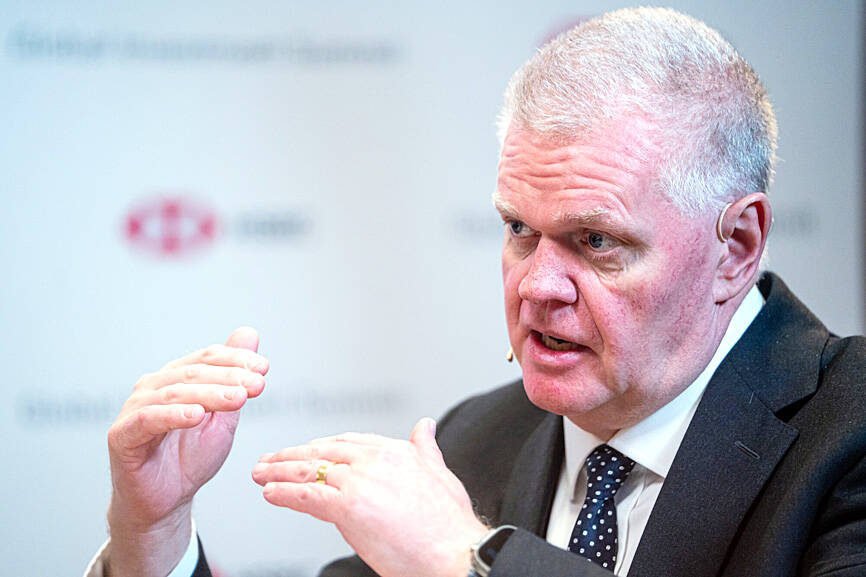HSBC Holdings PLC yesterday said that CEO Noel Quinn would retire after overseeing a “successful transformation” of the firm and record profits during almost five years in charge.
The surprise news came as the banking giant reported that pretax profits in the first quarter fell by US$200 million to US$12.7 billion, while revenue rose 3 percent to US$20.8 billion, reflecting higher customer activity in wealth products.
“During his tenure, HSBC has delivered record profits and the strongest returns in over a decade,” the lender said in a Hong Kong stock exchange filing.

Photo: Bloomberg
“He has successfully simplified and focused the bank, most recently with the sale of the Canada and Argentina operations and built a leading position on sustainability.”
The profit reflected a US$4.8 billion gain after HSBC completed the sale of its Canada business, partly offset by a US$1.1 billion impairment from the planned sale of its Argentina operations, the bank said.
HSBC also announced an interim dividend of US$0.10 per share and a share buyback of up to US$3 billion.
The bank said it had begun the process of finding a successor to Quinn and was considering internal and external candidates.
He would continue as CEO to “ensure a smooth and orderly transition,” the bank added, with his notice period expiring on April 30 next year.
Quinn said he intends to “pursue a portfolio career going forward” following an “intense five years.”
Under Quinn, the lender has accelerated a years-long pivot to Asia — where it generates most of its revenue — vowing to develop its wealth business and target fast-growing markets.
Quinn joined HSBC in 1987 and was appointed interim CEO in 2019 after several years leading its commercial banking unit.
He became HSBC’s permanent CEO in March 2020, when the bank’s shares in Hong Kong tanked sharply at the beginning of the COVID-19 pandemic.
The firm’s share price has risen more than 40 percent since then, but has yet to reach its pre-pandemic peaks.
HSBC yesterday rose 2.9 percent in Hong Kong, hitting a nine-month high.

When an apartment comes up for rent in Germany’s big cities, hundreds of prospective tenants often queue down the street to view it, but the acute shortage of affordable housing is getting scant attention ahead of today’s snap general election. “Housing is one of the main problems for people, but nobody talks about it, nobody takes it seriously,” said Andreas Ibel, president of Build Europe, an association representing housing developers. Migration and the sluggish economy top the list of voters’ concerns, but analysts say housing policy fails to break through as returns on investment take time to register, making the

NOT TO WORRY: Some people are concerned funds might continue moving out of the country, but the central bank said financial account outflows are not unusual in Taiwan Taiwan’s outbound investments hit a new high last year due to investments made by contract chipmaker Taiwan Semiconductor Manufacturing Co (TSMC, 台積電) and other major manufacturers to boost global expansion, the central bank said on Thursday. The net increase in outbound investments last year reached a record US$21.05 billion, while the net increase in outbound investments by Taiwanese residents reached a record US$31.98 billion, central bank data showed. Chen Fei-wen (陳斐紋), deputy director of the central bank’s Department of Economic Research, said the increase was largely due to TSMC’s efforts to expand production in the US and Japan. Investments by Vanguard International

WARNING SHOT: The US president has threatened to impose 25 percent tariffs on all imported vehicles, and similar or higher duties on pharmaceuticals and semiconductors US President Donald Trump on Wednesday suggested that a trade deal with China was “possible” — a key target in the US leader’s tariffs policy. The US in 2020 had already agreed to “a great trade deal with China” and a new deal was “possible,” Trump said. Trump said he expected Chinese President Xi Jinping (習近平) to visit the US, without giving a timeline for his trip. Trump also said that he was talking to China about TikTok, as the US seeks to broker a sale of the popular app owned by Chinese firm ByteDance Ltd (字節跳動). Trump last week said that he had

STRUGGLING TO SURVIVE: The group is proposing a consortium of investors, with Tesla as the largest backer, and possibly a minority investment by Hon Hai Precision Nissan Motor Co shares jumped after the Financial Times reported that a high-level Japanese group has drawn up plans to seek investment from Elon Musk’s Tesla Inc to aid the struggling automaker. The group believes the electric vehicle (EV) maker is interested in acquiring Nissan’s plants in the US, the newspaper reported, citing people it did not identify. The proposal envisions a consortium of investors, with Tesla as the largest backer, but also includes the possibility of a minority investment by Hon Hai Precision Industry Co (鴻海精密) to prevent a full takeover by the Apple supplier, the report said. The group is